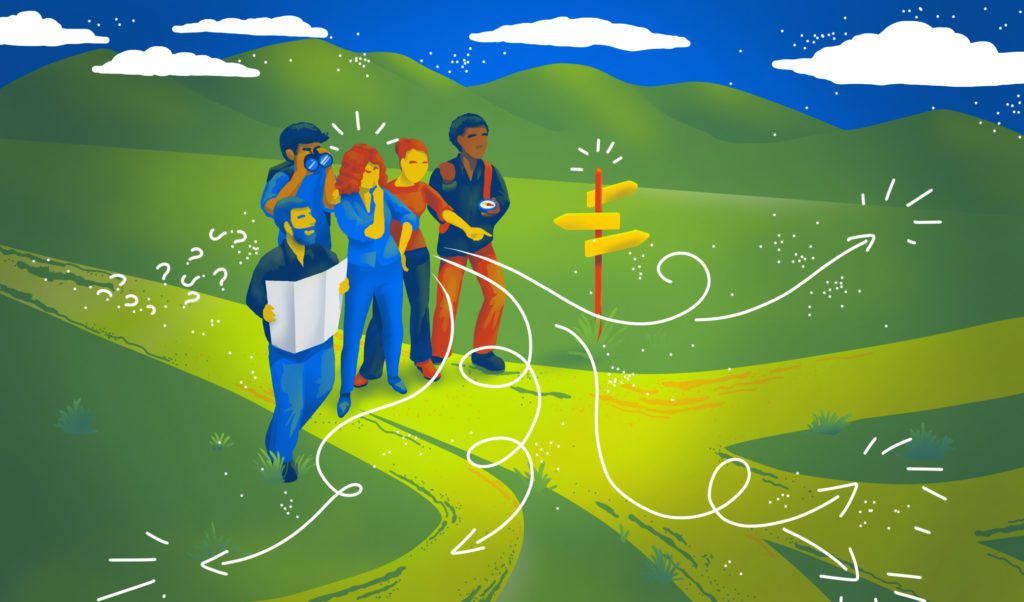As a naturally independent person, I find it somewhat difficult to ask for help. Let me rephrase, I find it grueling. I believe this has something to do with growing up in New York City. City kids stray away from asking for help because that would typically mean talking to strangers – which is something you are told explicitly and repeatedly not to do as a young person living in a huge city. Instead, we find a solution whatever way we can. This is generally how I approach life, so why would that be any different in the workplace?
Ahead of beginning my first office job this past January, I recognized that I wouldn’t know everything. I would have a lot to learn and was worried about how I could go about asking questions without feeling like I was bothering my colleagues. I was welcomed with a warm hello, a supervisor, a “buddy,” and onboarding meetings that consistently ended with, “please don’t hesitate to reach out and ask questions!” I felt incredibly supported; I still do.
I have a very unique position at the agency as a college co-op student where I am working at LifeSci Communications for six months total. Co-op, or cooperative education, is a program that Northeastern University offers to students in which we alternate academic study with full-time work. In a way, I’m a bit of an outsider. My official title is account communications co-op, but my work spans across multiple avenues and I collaborate with an abundance of people each day. In this unique position, it’s seemingly easy to feel disconnected from the greater agency, but somehow, I don’t.
LifeSci Comms has this system in place for new hires being onboarded in which they are given a “buddy.” When recounting my first day of work to my family and friends, I found myself embarrassed to mention my “buddy.” Something about this title makes me feel as though I am six years old, back at summer camp raising my hand up in the air while holding another kid’s hand during buddy check. Even as I write this, I am tempted to use the phrase “buddy system,” which also feels rather juvenile, yet I assure you that said buddy system has continuously prepared me for the very adult tasks that I employ daily.
I consider myself lucky to work at a place where I am genuinely valued, thought of, and cared for. My friends don’t have biweekly check-ins with supervisors or feel comfortable enough to have tough conversations with them, nor do they get the privilege of knowing their colleagues outside of work. Thankfully, I can’t relate to them at all.
Comparatively, I can count on more than two hands the amount of people I would go to in a crisis, which is unbelievable to me considering the short, albeit valuable amount of time I’ve been here. As a product of the confidence and trust my mentors have instilled in me, I go into the workday feeling capable yet ready to communicate when I’m in need of guidance. I’ve found that no matter what position someone is in, they are open to giving me a moment of their time. Naturally, I see any questions or clarifications I have as an inconvenience. What I have found is every time I ask questions, I am met with kindness, patience, and validation – giving me the chance to express uncertainty and improve my work moving forward.
There is a misconception, in life in general, not only in work, that asking for help is a weakness. And we see this as a weakness because it makes us vulnerable to admit that we are not perfect, we do not know everything, and that we might even be lost. It is so easy to perpetuate this misconception when your environment punishes you for being human, for not having all the answers. We are taught to be self-reliant to the utmost extreme and there is a certain level of professionalism that we aim to achieve. When we admit that we need others, it seems almost unprofessional because it implies that we are unprepared. What I’ve learned is quite the contrary.
In my first three months at LSC, I have been praised for asking questions and have received such positive and worthwhile feedback. My work is better for it, and I, too, as an employee and person, am better for it. In my short time in this business, I have seen and experienced the benefits of mentors who genuinely care and want to see me succeed. My mentors have taught me that asking for help is a skill. It shows confidence. Confidence in the work I know how to do and knowing when to admit that something is over my head. It’s worth admitting that I don’t know everything when it is treated as curiosity and devotion.
I’m not claiming that I will change overnight, however, I do understand that self-reliance is not feasible in life or in the workplace; having the right people in your corner is essential in discovering the true bounds of your potential. I encourage you to think of communicating confusion as a strength rather than a weakness and finding those at work that you can go to with confidence to ask questions.

